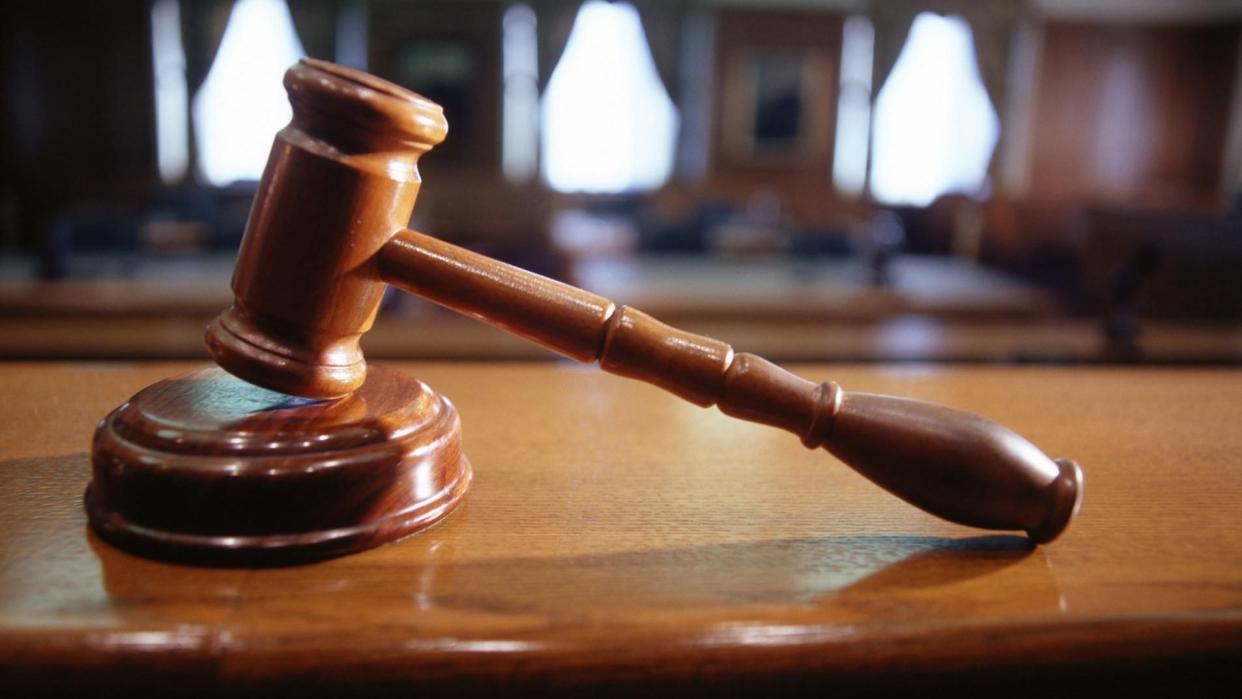Baltimore Police officer acquitted of assault, misconduct charges stemming from 2019 viral arrest video

- Oops!Something went wrong.Please try again later.
- Oops!Something went wrong.Please try again later.
A Baltimore Police officer was acquitted by a judge of assault and misconduct charges Friday after a viral video captured the officer placing his arm around a man’s neck as he called out in pain in late 2019.
Officer Leon Riley was charged with first- and second-degree assault, reckless endangerment and misconduct after he and Sgt. Brian Flynn arrested then-23-year-old David Dixon, who was brought to the ground. Video footage shows Riley’s arm around Dixon’s neck.
In footage of the incident, the man can be heard saying, “You choking me. You choking me, sir.”
During testimony this week, prosecutors played several officers’ body-worn cameras, and interviewed officers at the scene including Flynn, who helped Riley make the arrest.
Riley approached Dixon and other men in the 1600 block of West Lexington Street, an area identified by police as an open-air drug market, according to testimony.
Prosecutors argued that Riley unlawfully grabbed Dixon, and attempted to search him without cause. When Dixon began to resist, the two men fell to the ground and Riley and a Flynn tried to handcuff Dixon. In cellphone footage taken by a bystander, Riley is seen reaching around Dixon’s neck with his left arm.
Riley’s attorney, Chaz Ball, argued that his client was attempting to quickly secure Dixon, who was actively resisting officers, and officers believed he might have had a gun.
In his ruling from the bench Friday, Circuit Judge Philip S. Jackson said that while the video captured Riley placing one arm tightly around Dixon’s neck and holding it for “about 15 seconds” he did not appear to suffer injuries from the chokehold. He noted that none of the medical records presented at trial described any injuries to Dixon’s neck.
Jackson cited the case of George Floyd, who died after Minneapolis Police Officer Derek Chauvin kept his knee on Floyd’s neck for more than eight minutes, with Floyd saying “I can’t breathe.” Chauvin was later convicted of murder.
“Obviously, I could conclude that prolonged asphyxiation as was visited on George Floyd could create a substantial risk of death or serious injury,” Jackson said. “Not so the situation presented in this case where the possible blockage of an airway was measured in seconds.”
The judge also found that Riley intended “to force Dixon to comply with commands and cease his resistance, and no more than that. If his intention was otherwise, Riley would have continued the chokehold even after Dixon complied.”
Dixon was unable to testify in the case; he was killed in a shooting on March 1.
His mother, Marlo Campbell, said she was unaware that the trial was underway until reading a news story, and came to the courtroom Friday to hear the verdict. She was accompanied by the mother of Dixon’s 4-year-old daughter.
“Although he didn’t take my son’s life, he could have,” Campbell said outside the courtroom. She said her son has talked of past negative interactions with Riley, and she believes he should not remain on the force.
“My concern is this man hurting somebody” else, she said.
Neither Riley, nor Ball, his attorney, commented after the verdict.
Riley was hired by the department in 2012, and has been suspended without pay. He must return to court again on Dec. 1 for charges related to another case where he’s charged with assaulting two other men in April 2019 and committing perjury by lying in a statement of probable cause.
Riley was among more than 300 officers identified by State’s Attorney Marilyn Mosby’s office who were deemed by prosecutors to have credibility issues.
Mosby cited “police accountability” when criminal charges against Riley were filed in August 2020.
“If and when you violate that trust, you will be held accountable,” she said in a statement at the time.
A state’s attorney’s office spokeswoman did not respond to a request for comment on the verdict Friday.
Campbell said she was not surprised by Friday’s verdict. She said Dixon is the third son she has lost to gun violence in Baltimore.
“It’s like we don’t matter,” she said, adding that the video was especially painful to watch because she said her son was being respectful, calling Riley “sir.”
“They don’t know what he felt,” she said.

